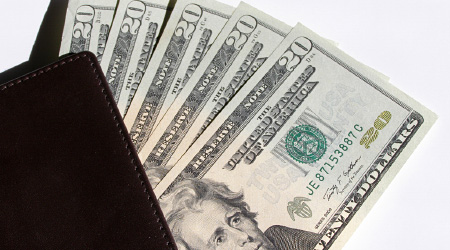Managing Your Checking Account

Now that you have a checking account, it's important that you manage it effectively. If you don't keep on top of the money coming and going from your account, you risk the embarrassment and financial penalties that come from spending money you don't have.
Opt-out of overdraft protection. Overdraft protection means that if you make a purchase with your debit card, and you don't have enough money in your account to complete the transaction, the bank will "loan" you the money...and charge you a $25-$35 fee for their "generosity." But that's a big price to pay to avoid the embarrassment or inconvenience of having your card declined or a check bounce. And these fees can add up fast, because here's what many consumers don't know: most banks will purposefully process your largest transactions first, and then your smaller transactions after that. So let's say you have $285 in your checking account, and you buy a coffee for $3.50 in the morning, a sandwich for $5 at noon, and then some college textbooks in the afternoon for $300. The banks will process the $300 transaction first, even though it was made later in the day, thus depleting your account, and then charge you a $35 overdraft fee for the textbooks, another $35 fee for the sandwich and another $35 for the coffee, and bill you for $105 in total overdraft fees. Ouch!
Banks used to automatically enroll their customers in overdraft protection programs, but a court ruling in 2010 made that illegal. You can and should opt out of overdraft protection. But because overdraft fees were a big moneymaker for banks, they still aggressively try to get you to sign up. Every time I check my bank account online, I get a pop-up that asks if I'm sure I don't want to enroll in their overdraft protection program. You just have to say no and keep saying no.
Check your account weekly. Make a habit of checking your account online every week. Not only does this keep you abreast of how much you have in your account so you don't overspend, it gives you a chance to check for errors or fraudulent transactions. If you notice any errors or possible fraudulent transactions, notify your bank immediately.
Also, sometimes when you have something set up on autopay, like a gym membership or Netflix, that makes a withdrawal from your checking account every month, even when you cancel the service, they can "forget" to stop charging your account. Be on the lookout for this.
Understand that the balance your bank statement says you have could actually be more than you really have. This is something that trips up a lot of young people when they first get a checking account. Your bank says you have $750 in your checking account, so you pay your $500 rent. A few days later you get notice from your bank that you're being charged an overdraft fee and you have an account balance of -$50. What happened?
Well, a week earlier you wrote a check for $300 for tuition, but it still hadn't cleared when you checked your checking account. After you sent a check to your landlord, the tuition check finally cleared, leaving you in the hole and facing a stiff overdraft fee.
Because of the delay between the moment the transaction occurs and when it actually posts, it's important to track all your debit card transactions, ATM withdrawals, and checks written in a check register (You can use the old fashioned paper registers or a digital one like Quicken or Mint. I know some folks who use a simple Excel spreadsheet). A check register lets you know how much you really have available in your account. Don't think you can mentally keep track of it. At some point you'll forget. I know from experience.
Set-up online alerts for when your balance reaches a certain level. To play it safe, establish a base amount for your checking account that you'll never go under. That small amount acts like a firewall for bounced checks. Take it a step further by setting up an alert with your bank's online system that will notify you whenever your checking account balance gets within $50 of your minimum balance. Once you get the alert, cut back on spending and deposit some money.
Use direct deposit for your paychecks and pay bills online. Whenever you land a job, ask your employer to automatically deposit your paychecks into your checking account. You'll have to sign a form and provide a voided check to get auto-deposits set up. Where available, pay as many of your bills online as you can and make them automatic. We'll be talking more about that later this month.
Balance your checkbook monthly. You've probably seen your parents balance their checkbooks. Balancing a checkbook simply means reconciling the balance your bank says you have in your account with the balance you have in your records. Remember, with the delays between checks clearing, those numbers can be off.
People are divided on whether you need to balance a checkbook in our world of digital finances. But even with the speed of digital transactions, things can get off kilter in your account, so it's not a bad idea to reconcile your account at least once a month. Money software like Quicken and YouNeedaBudget make this process a breeze. They'll automatically reconcile your accounts with a click of a button. Sometimes, though, you'll need to bust out the old pen and paper to do some figuring.







